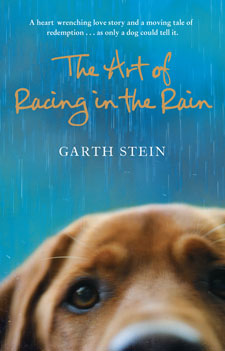The Art of Racing in the Rain is an unforgettably engaging tale, which takes you on a journey through the eyes, mind and nose of a dog.
At times it is heart wrenching, then whimsical, often funny and ultimately uplifting and thought provoking, centering on aspects of family, love, redemption, loyalty and hope in the face of despair.
 The canine narrator, Enzo, has much to teach us about being human. He knows he is different to other dogs. He has learned much about life from watching television and listening to his master, who is an up and coming race car driver, Denny.
The canine narrator, Enzo, has much to teach us about being human. He knows he is different to other dogs. He has learned much about life from watching television and listening to his master, who is an up and coming race car driver, Denny.
Through Denny, Enzo has learned that life isn’t just about going fast, and that techniques used on the racetrack can also be successfully employed in navigating life.
Enzo relates the story of his human family, sharing their tragedies and triumphs. He sees his own limitations yet despite this manages to preserve the family which is on the brink of being torn apart. He cannot speak but understands everything going on around him. His inability to speak heightens his listening ability and this gives him greater insight into the workings of the family.
On the eve of his death Enzo takes stock of his life and all that he has learned to be a wise and compassionate person. He is eagerly waiting to return in his next lifetime when he will surely be a man.
This gentle love story is creatively and carefully crafted and almost effortlessly engages the reader in its moving journey. While the old dog has much to teach us about being human there is an underlying subtle conclusion drawn " that there are no limitations to what we can achieve if we truly know where we want to be.
Enzo is an engaging hero type of almost-human proportions and the universal themes of love and redemption are gently yet satisfyingly drawn in human terms. There is much Enzo can teach us about the human condition and he offers insights through his role as a “watcher” in the drama of life as well as a participant. We are left to draw on these lessons ourselves as the writer lightly sketches in the outlines.
There are lingering truths to ponder. Enzo is a kind of anti-hero so his “teachings” are less direct than many of Jesus’ teachings, which were often hard-hitting and directed at a specific group.
A cleverly executed unique novel which has been compared to The LIfe of Pi or Jonathan Livingston Seagull novels which also use metaphor to flesh out a philosophical view of life and touch on universal themes of love and redemption. There is an uplifting, exultant sense at the end, but it is perhaps a little fanciful.
Christians would baulk at the implication in this book of a “second chance” for humans, a returning to this world greatly empowered with learned wisdom. However, it is in keeping with the book's view of the potential of humanity suggested. Christians may find the perspective rather lacking, a look through the wrong end of the telescope on life with no reference to a God of love who sent his son as a redeemer. Only his redemption provides our “second chance”.























